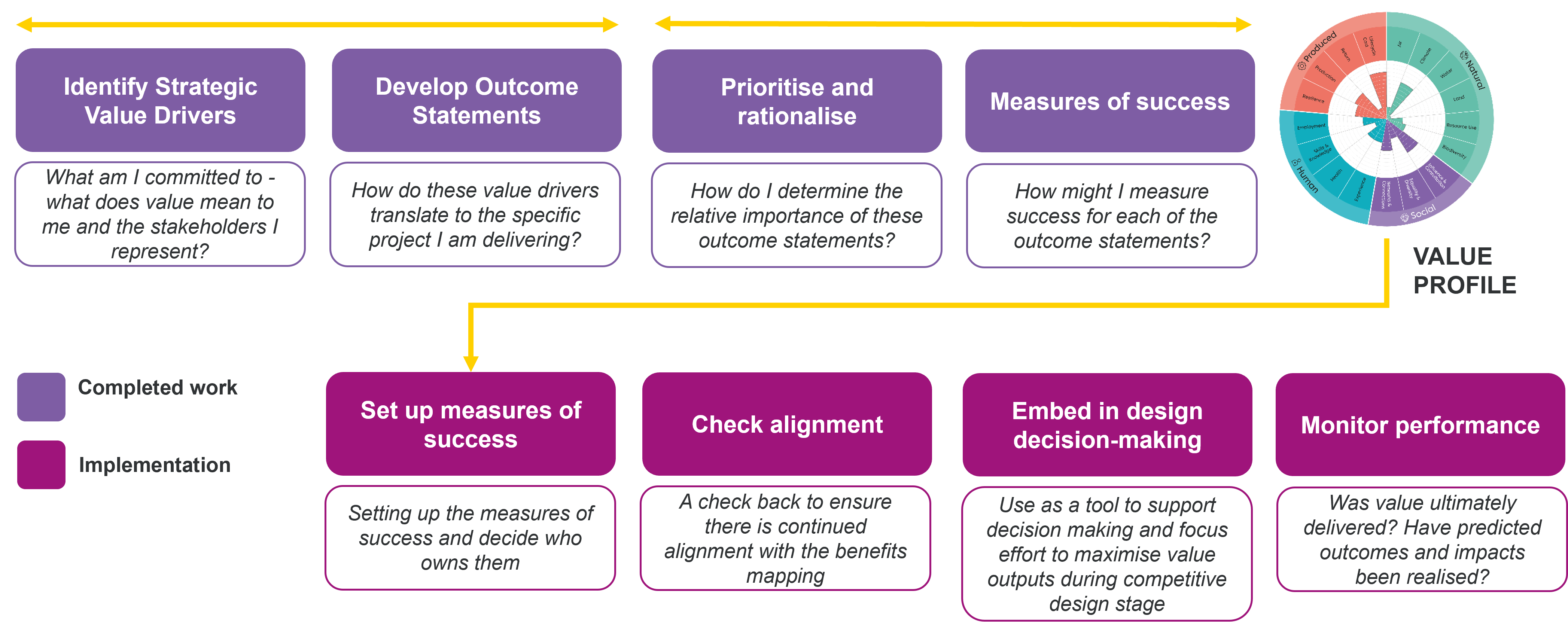Heathrow 2.0: an engine for sustainable growth
Author: Jeremy Galpin, Social value consultancy lead
Introducing the Value Toolkit
Our purpose is improving people’s lives and as part of Team Heathrow, we are committed to leveraging the investment in Heathrow’s capital programmes to create social, economic and environmental benefits for local communities. This approach supports the implementation of the Heathrow 2.0 Sustainability Strategy which sets out a blueprint for sustainable growth around the two main pillars of driving net zero aviation and shaping a great place to live and work.
We have piloted the use of the Value Toolkit a methodology which was co-created by government and industry (and which we helped to develop) to ensure that the Terminal 2 Baggage Programme delivers these benefits across the Four Capitals. While our overarching programme aim remains to implement a world-class baggage system with high-performing systems and operational processes that deliver better outcomes, the Value Toolkit allows us to bridge the gap between ambitions and outcomes - ensuring a fully optimised design that addresses social, economic and environmental priorities. HM Treasury said of the Value Toolkit on its launch: “It could be particularly useful in both development and delivery workshops, to help translate high level economic, environmental, and social objectives into key areas of focus for design and delivery.”
Turbocharging social, economic and environmental value on the Terminal 2 Baggage Programme
Through dedicated and collaborative workshops, we created a value profile for the project and identified and agreed a series of targeted interventions throughout its lifecycle (design, delivery, ongoing operations and maintenance) which would maximise the creation of value in all its forms.

On this programme, the measures of success tend to cluster around Produced Capital, considering factors such as whole lifecycle cost, resilience and security. Our Natural Capital assessment focused on reducing both carbon emissions and lowering the consumption of materials and energy in the construction and operational phases. Human Capital explores the expertise and knowledge needed to successfully deliver the project, with a focus on employment opportunities, while under Social Capital, we discussed integrated working and collaboration, and Equity, Diversity and Inclusion. The findings of this assessment of the potential to create social, economic and environmental benefit culminated in an agreed list of 20 priority outcomes. A key takeaway from the process has been the further development of the Sustainability Management Plan to incorporate these outcomes. The Value Toolkit is already demonstrating its worth, with the most tangible achievement to date the inclusion of these principles in the procurement process for the new baggage system, to be manufactured by Beumer.
We also have a mechanism in place which allows us to ensure that our supply chain plays its part in creating value in all its forms. We’ll take a deep dive into sustainable procurement in the next edition of the Procurement newsletter and for now, we’ll examine how we brought to life one of our priority outcomes, accessibility.
Accessibility
Representation is critical – not only improving the lives of the individuals we engage with, but also ensuring that Heathrow’s workforce is representative of the wider population and able to come up with solutions that meet the needs of a diverse customer base. Research shows that many of the traits of neurodivergent people align to the skillsets required by business and there are many ways we can adapt to become a more inclusive employer, such as by digitising operations. The impact that this step-change in approach has on both the passenger experience and the quality of decision-making is significant.
The Value Toolkit provided the space for the team to have conversations around accessibility, to understand the view of other stakeholders, and for us to collaboratively balance the different demands and requirements. The Value Toolkit has the potential to be a tool that enables project managers to improve the application of a balanced approach to Heathrow 2.0, including embedding accessibility, so that we are open to everyone.
Through the interactive workshops, we defined accessibility and specifically, neurodiversity, as a key focus area. We identified that there were up to 68,000 neurodivergent young people in Heathrow’s local boroughs, who may experience barriers to accessing education and employment. As a result, we are developing a volunteering scheme with local schools and colleges which focuses on accessibility and includes hosting neurodivergent young people for work experience.
Supporting neurodiversity is key to satisfying the needs of today’s and future end users and providing a more inclusive workplace.
Next steps
To find out how you can get involved, please contact Jeremy Galpin who will be able to share further information with you.

